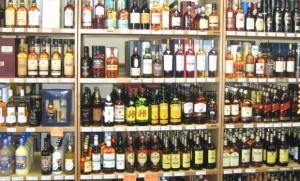
OCEAN CITY — With bills pending in the General Assembly that could allow big-box stores and convenience stores to sell beer, wine and liquor, the local independent stores are circulating a petition against the proposed legislation.
In each of the last few years, legislation has been submitted in the Maryland General Assembly that would allow big-box retailers such as Wal-Mart, Costco or Sam’s Club, for example, along with convenience store chains such as 7-Eleven, Wawa and Royal Farms, to sell beer, wine and liquor. For a variety of reasons, the legislation has not made it through.
This year, however, multiple bills allowing big corporations to sell alcohol in Maryland are expected to be filed. In response, the Worcester County Licensed Beverage Association (WCLBA) is already circulating a petition against the proposed legislation and the competition it could bring for local mom-and-pop establishments.
WCLBA Executive Director Charlene Elliot-Carr, who also serves as sergeant-at-arms for the Maryland Licensed Beverage Association, is leading the effort at the local level.
“There has always been a big push from the chains with big money behind them to put beer, wine and liquor in,” she said. “Now, the big corporations have stepped in. They want beer, wine and liquor in their stores.”
Elliott-Carr said the proposed legislation, if approved, would put beer, wine and alcohol sales practically everywhere. On the one hand, it could make for one-stop shopping for consumers, but on the other hand, it could make alcohol more readily available at a time when strides are being made on certain detrimental indicators.
“Do we want alcohol in the grocery stores?” she said. “Do we want alcohol everywhere? The numbers have been going down for underage drinking and binge drinking for the first time in a long time.”
Additionally, allowing big corporations to sell alcohol in their chain stores could severely hurt locally-owned stores, many of which are already hurting in the midst of a pandemic and a limping economy. For example, big corporations have the buying power to purchase alcohol in bulk at deeply discounted prices and warehousing it, creating an unfair competitive advantage for the often hand-to-mouth-mom-and-pop outlets.
“Our mom and pops are already struggling,” said Elliott-Carr. “How can they compete with the big corporations with deep pockets that can get deep discounts on bulk purchases and warehouse it?”
Local package store clerks, along with bartenders and servers, are required to take stringent training courses for checking identification, recognizing a purchaser’s level of intoxication and preventing sales when inappropriate. Elliott-Carr, who teaches such classes locally, said she was uncertain similar training would be required or adhered to by check-out people ringing up groceries as well as big-screen televisions in a big-box retailer.
“It’s an education nightmare,” she said. “Their turnover is pretty high. I’m not sure their clerks and counter people are going to get the same level of training as the smaller mom-and-pop stores. At least the small businesses have a liquor license on the line and if that’s taken away, that’s their livelihood.”
Elliott-Carr also pointed out how much the locally owned businesses with off-sale licenses support their communities. In addition, with the pandemic’s impact still lingering, many local businesses have reverted to a carryout business model, which could remain in place when the coronavirus ultimately runs its course.
“Think about how much the mom and pops donate to charity, whether it’s sponsoring a Little League team or a lacrosse team or other contributions,” she said. “You don’t get that level of community participation from the big corporations.”
Elliott-Carr said with the General Assembly session quickly approaching and the modifications associated with COVID, legislators are being encouraged to get bills in early and already 400 bills have been pre-filed. While legislation allowing for an expansion of liquor sales in Maryland still pending, the WCLBA is getting its petition in the hands of its members.
“We’re just waiting for the bills so we can see the wording and figure out how best to go after them,” she said. “We do have a representative, but for now, the petition is a good start. Things will be different this year in Annapolis with the way hearings are held and testimony is taken. We just want to be out in front of it.”
Language in the petition clearly spells out the objective.
“Maryland’s small businesses are under attack by major out-of-state corporations who want to increase their profits by selling alcohol in chain stores,” the petition reads. “Multi-million-dollar corporations like Dollar Tree, 7-Eleven, Harris Teeter and Wegman’s are threatening to put locally-owned, family-run liquor stores out of business.”
For now, the petition is being circulated on the WCLBA Facebook page, although Elliott-Carr said she is awaiting a printed version that will be distributed to members via mail and email.

